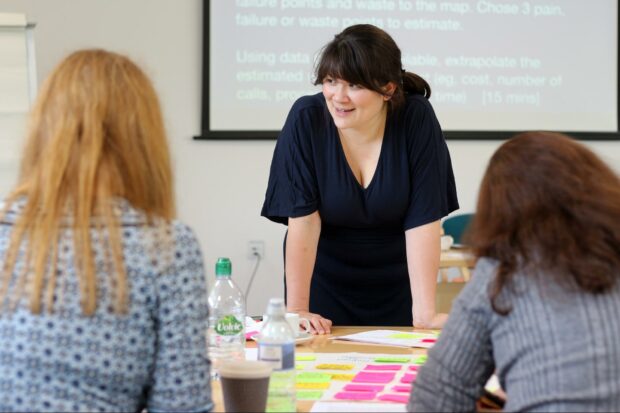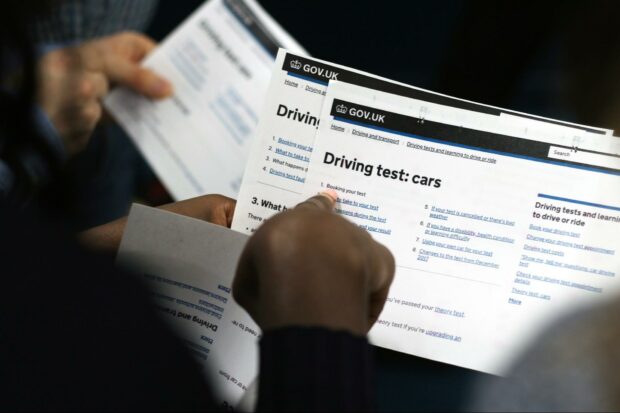Following on from our reflections on the user-centred design communities (UCD) team, in this post we’ll share some of the successes of the UCD communities team and UCD communities of practice.
The UCD communities of practice support over 4,000 people working in design, user research and accessibility in the public sector to learn with and from each other, share good practice, and work together on shared challenges. From 2017 to 2020 the UCD communities team managed and supported the UCD communities.
What the team achieved
The UCD communities team always ensured the community formats and channels were designed based on community needs. Every community is unique and changes over time, so it’s vital that the central supporting functions conduct continuous research with the community, listening to and responding to its changing needs.
Advocated for user-centred design
The team created a UCD induction workshop for the Government Digital Service (GDS), trained over 100 people, and recruited 5 UCD practitioners to run the workshop.
We designed an ‘Introduction to user-centred design in government’ course for the GDS Academy to deliver across 4 UK locations, training thousands of people across government.
We ran sessions for GDS staff, such as at a remote all-staff event where we ran a workshop called “What is UCD anyway?” advocating for UCD requires time and persistence. We advocated for UCD with GDS management and senior leaders, raising awareness of UCD and keeping GDS accountable.

Built UCD capability
We created, delivered and iterated 11 training courses and workshops, running them over 150 times with more than 4,000 attendees.
- “Basic introduction to user research in government” was run 32 times with more than 1,200 attendees
- “Introduction to being a designer in government” was run over 30 times with more than 1,000 attendees
- “Introduction to service design” was run 27 times with more than 700 attendees
- “Introduction to accessibility” was run 19 times with nearly 700 attendees
- “Getting started with the GOV.UK Prototype Kit” was run 12 times with more than 300 attendees
- “Service mapping for practitioners” was run 4 times with about 100 attendees
- “Power and privilege in designing and building public services” was run 4 times with more than 50 attendees
- “Service design in practice” was run 6 times with about 90 attendees
- “Cross-government peer critique day” was run approximately 10 times with about 100 attendees
- “User research ethics for practitioners” was run approximately 4 times with about 80 attendees
- “Introduction to survey design” was run approximately 6 times with about 120 attendees
The demand for these courses was always far more than we could supply. Tickets would sell out in a matter of hours, and our waiting list had more than 500 people on it. As a small team, of whom several were part-time, we were always on the lookout for ways to increase our capacity.
We scaled up these courses by working with 15 members in our cross-government UCD trainer network from the Department for Education, NHS, Department of Work and Pensions, GDS and beyond. Our courses were run in many different cities in the UK including Blackpool, Brighton, Manchester, Newcastle and Newport.
The team designed and delivered training in an iterative, agile and learner-centred way. Our courses took an active learning approach, where attendees learnt by doing, and learnt from each other.
The team ran Get Feedback sessions and design critique days, which are informal but structured, safe and inclusive ways for people across the public sector to get feedback from others.
Cross-government design buddy groups, where groups of 5 designers meet up regularly to share ideas and discuss problems, launched in 2020 and continue into 2021.
Defining and sharing good practice
Equity and inclusion
Our team conducted research with GDS and the cross-government UCD communities to explore how the communities worked, what their changing needs were and where people were being excluded.
We reserved spaces in our training courses and meetups for people from historically excluded groups in UCD.
We set the standard for how community events ran, provided a code of conduct and always worked to make community spaces safe and inclusive for all participants.
Events and meetups
We ran meetups every month in cities across the UK, in partnership with different public sector organisations. Each meetup grew from just a handful of attendees to hundreds of people over the years. We ran a total of:
- 13 accessibility meetups
- 15 design meetups
- 15 user research meetups
- 9 service design meetups
We still regularly run several formats for sharing case studies in government:
- “Service Thursday” - a monthly case study event
- “Discuss a design challenge” - a monthly talk and discussion
- “User Research Mondays” - a monthly case study or methods and tools sharing session
- accessibility meetups - a regular meetup on issues in accessibility in the public sector
- design meetups - a regular meetup for the UCD community about design, including talks from the private sector
Services Week is a self-organised, annual, week-long event where teams across government run a huge variety of different types of events to spread the message of designing user-centred, end-to-end services.
We created and supported the International Design in Government community and conferences. The first conference was in 2018 in London and was attended by 220 people from 26 countries. We continue to run regular calls with the international community. So far we’ve organised 22 calls on various topics such as service standards, COVID-19 responses, design systems and accessibility.
Community content creation
The community contributes to case studies, user research, design and accessibility blog posts, meetup presentations, and newsletters like the monthly UCD newsletter.
Supporting the community
With the cross-government heads of design, we established cross-government design objectives for community members to add to their performance objectives, such as contributing to the GOV.UK Design System or becoming a design assessor.
The community uses Google Groups and Slack to stay in touch, share and ask questions. We created, supported and managed these channels.
Recruitment and onboarding
The team supported other government departments with recruitment, helping to hire numerous heads of design and design leads.
We created an induction resource for people new to government and UCD to help them find the right channels and get started in their role.
Measuring the value of UCD
We started to develop tools for public sector organisations to identify their UCD maturity and gave them tips on how to grow their capability. This is an early prototype of a ‘How user-centred is your team?’ quiz (preview only) that we developed for internal training.
We continuously gathered feedback from events and training, tracking and monitoring the impact of the UCD community on public services.
Guiding and aligning direction of UCD in government
Doing and sharing all the work above has been a driving force for UCD in government in the UK and internationally.
We convened regular meetings with the cross-government heads of UCD to work on shared challenges, and to share updates, and learning and development opportunities—these meetings still continue.
How members describe the benefits of the community
The UCD community has helped save time and enable quick delivery of services like COVID-19-specific services, through timely collaboration and sharing.
So, right now my team has saved tonnes of time not having to work out our own bespoke accessibility response for new legislation, we’re using tried and tested examples from others in the community. We’ve saved weeks of design and development time reusing patterns and code pointed out to us in other services after asking a quick question in Slack.
—Service Owner, Ministry of Justice (MoJ)
The UCD community has helped services join up and work across government silos.
... having a network of people you can reach out to when trying to solve problems, or tackle “whole problem” areas that cut across silos. Learning more about cross-government work, to build empathy and context for people in other departments and how they work because it differs across each organisation. The community has helped me to do my job more effectively, to be more joined-up in terms of ways of working and the services we’re working on, and to be more empathetic to others working in government.
—Design Lead, Government Digital Service (GDS)
It makes us think about services as a public-sector thing rather than a ‘just-our-organisation thing.
—User Research Lead, Care Quality Commission

The UCD community has helped teams build better quality services.
UCD content, training and community discussion always brings things back to value for the user, whether the people who have to interact with government services or staff who run them. It keeps me delivering public value, good value for the taxpayer.
—Service Owner, MoJ
We've directly used methods described in case studies into our work, creating better interactions and more joined-up services
—Design Lead, Department for Work and Pensions (DWP)
The UCD community has helped teams improve the accessibility of services and meet legal requirements.
We have been able to start accessibility audits and have a better understanding. This has led to vastly improved transport services for my region.
—Designer, West Midlands Combined Authority
The accessibility community has been very useful to understand how others are handling more tricky aspects of the new regulations.
—Product Manager, local government
I was able to go back to my service team about accessibility and push for more direct contact with users of assistive technology, plus a more rounded view of what accessibility means.
—Content Designer, DWP
The UCD community continues to benefit public servants. By capturing the UCD communities team’s successes and reflections we hope to ensure the next team(s) can easily pick up where we left off.
We’d love to hear your stories about how the UCD community has impacted you and your work in the comments!
Join the channel #design on the cross-government Slack or follow #govdesign on Twitter to learn more about user-centred design work in government and related upcoming events.
